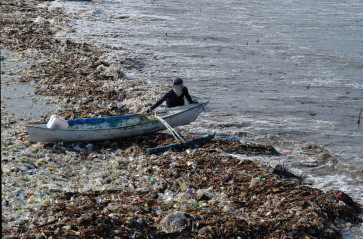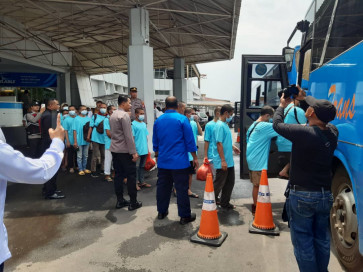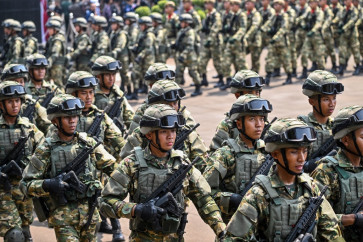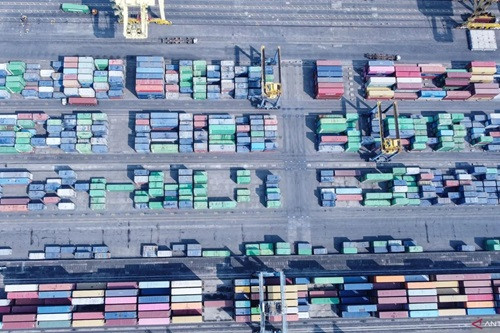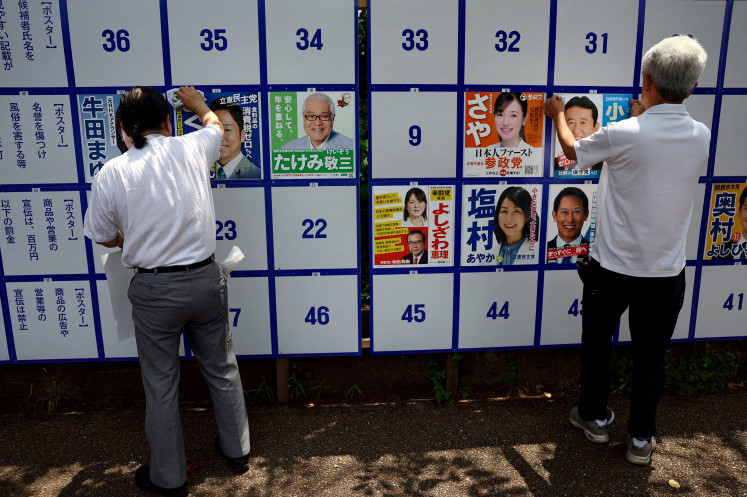Popular Reads
Top Results
Can't find what you're looking for?
View all search resultsPopular Reads
Top Results
Can't find what you're looking for?
View all search resultsThe future of our marine environment
Against the backdrop of the Java Sea, Indonesiaâs president-elect Joko âJokowiâ Widodo delivered his first speech after officially being declared winner of the recent election
Change text size
Gift Premium Articles
to Anyone
A
gainst the backdrop of the Java Sea, Indonesia's president-elect Joko 'Jokowi' Widodo delivered his first speech after officially being declared winner of the recent election. Amid all the talk of renewed unity after what was a bitter campaign, one bold statement went largely unnoticed.
Yet it was an important sign of intent from our new leader. Indonesia's rich maritime resources, Jokowi confirmed, would be the focus and foundation of future development in Indonesia.
This is a logical place to focus our attention. Indonesia is, after all, home to 75 percent of the world's coral species, at least 30 percent of fish species, 20 percent of total global mangrove cover, as well as numerous species of seagrass.
With at least 60 percent of Indonesia's population living along the coastline, focusing development in this area should help to improve lives and strengthen Indonesia's position as a rising economic powerhouse.
However, in recent decades, the story of Indonesia's management of natural resources has been one dominated by degradation and increased threats.
In 2009 and 2010, our reefs from Aceh to Papua were struck by a sudden rise in sea temperature, new diseases are affecting our corals and massive new coastal and inland developments are being proposed at the expense of mangroves and marine environments.
President-elect Jokowi and his new administration now have an opportunity to turn things around, by focusing on a new and genuinely sustainable, inclusive approach to resource management. They can change the story of Indonesia's relationship to its natural resources.
On the campaign trail, we heard repeated promises that economic development and job creation should not be allowed to undermine the health of Indonesia's unique natural environment.
Now is the time to turn those good intentions into action by outlining a clear plan to manage effectively Indonesia's rich resources and mitigate the effects of climate change.
There should be three priority areas for the new government and Indonesian society. First, we must tackle the inadequate and ineffective enforcement of existing laws.
For example, in the context of the marine environment, the new government could promote the use of integrative port surveillance systems and aerial drones to address the problem of illegal, unreported and unregulated fishing.
The government should recognize the vast geographic areas that need to be covered and the current lack of capacity and interest among our law enforcement.
Including local communities in the process and providing incentives for good behavior would be a positive first step. We should harness the power of technology and recruit the people who live and work with our natural resources to reinforce government efforts. At Reef Check Foundation Indonesia, we are working on developing mobile apps for community-based monitoring of local reefs.
Second, the new president should instruct his ministers to include the 2012 National Action Plan for Climate Change Adaptation ' which provides a path to address and mitigate the effects of climate change across all sectors ' in their development agendas. The action plan should be integrated into all levels of government, from national and ministerial level, to provincial, district and village levels.
We must stop seeing climate change as a side issue and instead acknowledge that it is a growing threat to our nation and our way of life. It is already happening. We must have a clear strategy to mitigate its effects and build resilience in our communities so as to manage the impact of climate change.
Finally, the new government should continue to reform Indonesia's vast bureaucracy. We must have the right people in the right places and choose the right person to lead ministerial offices, applying the right systems and policies.
And we must create a system able to adapt quickly to changes, challenges and technological advances.
Yes, president-elect Jokowi and the people of Indonesia have a lot of issues to deal with. All countries do. But with massive challenges come great opportunities.
So, welcome Mr. president-elect: There is much work to be done. But you have given us new hope that
we can revisit the way we view development and our relationship with nature. As our young democracy matures to embrace its political and ethnic diversity, so we should be protecting and nurturing the diversity of our natural environment.
_______________
The writer is director of Reef Check Foundation Indonesia and a fellow at the Aspen Institute's New Voices Fellowship.


